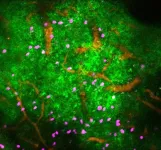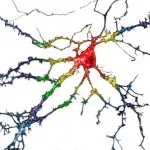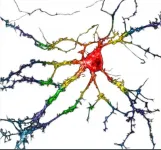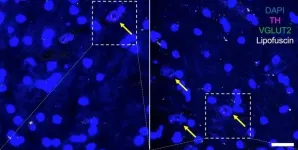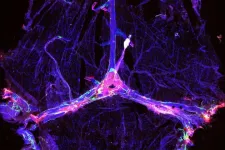(Press-News.org) The neurotransmitter noradrenaline, which plays a key role in the fight-or-flight stress response, impairs immune responses by inhibiting the movements of various white blood cells in different tissues, researchers report April 28th in the journal Immunity. The fast and transient effect occurred in mice with infections and cancer, but for now, it's unclear whether the findings generalize to humans with various health conditions.
"We found that stress can cause immune cells to stop moving and prevents immune cells from protecting against disease," says senior study author University of Melbourne's Scott Mueller (@SMuellerLab) of the Peter Doherty Institute for Infection and Immunity (Doherty Institute). "This is novel because it was not known that stress signals can stop immune cells from moving about in the body and performing their job."
One main function of the sympathetic nervous system (SNS) is to coordinate the fight-or-flight stress response--a group of changes that prepare the body to fight or take flight in stressful or dangerous situations to protect itself from possible harm. Most tissues, including the lymph nodes and spleen, are innervated by SNS fibers. Stress-induced activation of the SNS can suppress immune responses, but the underlying mechanisms have been poorly characterized. "We hypothesized that SNS signals might modify the movement of T cells in tissues and lead to compromised immunity," Mueller says.
White blood cells, also known as leukocytes, travel constantly throughout the body and are highly motile within tissues, where they locate and eradicate pathogens and tumors. Although the movement of leukocytes is critical for immunity, it has not been clear how these cells integrate various signals to navigate within tissues. "We also speculated that neurotransmitter signals might be a rapid way to modulate leukocyte behavior in tissues, in particular during acute stress that involves increased activation of the SNS," Mueller says.
To test this idea, the researchers used advanced imaging to track the movements of T cells in mouse lymph nodes. Within minutes of being exposed to noradrenaline, T cells that had been rapidly moving stopped in their tracks and retracted their arm-like protrusions. This effect was transient, lasting between 45 and 60 minutes. Localized administration of noradrenaline in the lymph nodes of live mice also rapidly halted the cells. Similar effects were observed in mice that received noradrenaline infusions, which are used to treat patients with septic shock--a life-threatening condition that occurs when infection leads to dangerously low blood pressure. This finding suggests that therapeutic treatment with noradrenaline might impair leukocyte functions.
"We were very surprised that stress signals had such a rapid and dramatic effect on how immune cells move," Mueller says. "Since movement is central to how immune cells can get to the right parts of the body and fight infections or tumors, this rapid movement off-switch was unexpected."
Other experiments revealed that SNS signals inhibit the migration of distinct immune cells, including B cells and dendritic cells, exerting these effects in different tissues such as skin and liver. Additional results suggest that the effects of SNS activation on cell motility may be mediated by the constriction of blood vessels, reduced blood flow, and oxygen deprivation in tissues, resulting in an increase in calcium signaling in leukocytes.
"Our results reveal that an unanticipated consequence of modulation of blood flow in response to SNS activity is the rapid sensing of changes in oxygen by leukocytes and the inhibition of motility," Mueller says. "Such rapid paralysis of leukocyte behavior identifies a physiological consequence of SNS activity that explains, at least in part, the widely observed relationship between stress and impaired immunity."
Moreover, SNS signals impaired protective immunity against pathogens and tumors in various mouse models, decreasing the proliferation and expansion of T cells in the lymph nodes and spleen. For example, treatment with SNS-stimulating molecules rapidly stopped the movements of T cells and dendritic cells in mice infected with herpes simplex virus 1 and reduced virus-specific T cell recruitment to the site of the skin infection. Similar effects were observed in mice with melanoma and in mice infected with a malarial parasite.
"Our data suggest that SNS activity in tissues could impact immune outcomes in diverse diseases," Mueller says. "Further insight into the impact of adrenergic receptor signals on cellular functions in tissues may inform the development of improved treatments for infections and cancer."
The degree to which SNS activation affects leukocyte behavior or disease outcomes in humans remains to be determined. Notably, increased SNS activity is prominent in patients with obesity and heart failure, while psychological stress can cause blood vessel constriction in patients with heart disease. An unappreciated impact of increased SNS activity, particularly in individuals with underlying health conditions, might be impaired leukocyte behavior and functions. The findings may also have important health implications for patients who use SNS-activating drugs to treat diseases such as heart failure, sepsis, asthma, and allergic reactions.
Moving forward, the researchers will further examine the mechanisms by which immune cells are affected by SNS stress signals and explore relevant strategies to boost anti-cancer responses in patients. "This knowledge will allow us to test the impact of drugs that block the sympathetic stress pathway, such as beta blockers, on the outcomes of vaccination and cancer treatments," Mueller says. "These types of drugs might be safe treatment options for patients where stress could contribute to poor immune function."
INFORMATION:
This work was supported by the National Health and Medical Research Council of Australia and the Australian Research Council.
Immunity, Devi et al.: "Adrenergic regulation of the vasculature impairs leukocyte interstitial migration and suppresses immune responses" https://www.cell.com/immunity/fulltext/S1074-7613(21)00137-0
Immunity (@ImmunityCP), published by Cell Press, is a monthly journal that reports the most important advances in immunology research. Topics include immune cell development and senescence, signal transduction, gene regulation, innate and adaptive immunity, autoimmunity, infectious disease, allergy and asthma, transplantation, and tumor immunology. Visit: http://www.cell.com/immunity. To receive Cell Press media alerts, contact press@cell.com
Psychedelic drugs have shown promise for treating neuropsychiatric disorders such as depression and posttraumatic stress disorder. However, due to their hallucinatory side effects, some researchers are trying to identify drugs that could offer the benefits of psychedelics without causing hallucinations. In the journal Cell on April 28, researchers report they have identified one such drug through the development of a genetically encoded fluorescent sensor--called psychLight--that can screen for hallucinogenic potential by indicating when a compound activates the serotonin 2A receptor.
"Serotonin reuptake inhibitors have long been used for treating depression, but we don't ...
A genetically encoded sensor to detect hallucinogenic compounds has been developed by researchers at the University of California, Davis. Named psychLight, the sensor could be used in discovering new treatments for mental illness, in neuroscience research and to detect drugs of abuse. The work is published April 28 in the journal Cell.
Compounds related to psychedelic drugs such as LSD and dimethyltryptamine (DMT) show great promise for treating disorders such as depression, post-traumatic stress disorder, and substance use disorder. These drugs are called psychoplastogens ...
It's one of the most audacious projects in biology today - reading the entire genome of every bird, mammal, lizard, fish, and all other creatures with backbones.
And now comes the first major payoff from the Vertebrate Genome Project (VGP): near complete, high-quality genomes of 25 species, Howard Hughes Medical Institute (HHMI) Investigator Erich Jarvis with scores of coauthors report April 28, 2021, in the journal Nature. These species include the greater horseshoe bat, the Canada lynx, the platypus, and the kākāp? parrot - one of the first high-quality ...
Researchers have big ideas for the potential of quantum technology, from unhackable networks to earthquake sensors. But all these things depend on a major technological feat: being able to build and control systems of quantum particles, which are among the smallest objects in the universe.
That goal is now a step closer with the publication of a new method by University of Chicago scientists. Published April 28 in Nature, the paper shows how to bring multiple molecules at once into a single quantum state--one of the most important goals in quantum physics.
"People have been trying to do this for decades, so we're very excited," said senior author Cheng Chin, a professor of physics at UChicago who said he has wanted ...
PITTSBURGH, April 28, 2021 - It is not every day that scientists come across a phenomenon so fundamental that it is observed across fruit flies, rodents and humans.
In a paper published today in Aging Cell, neuroscientists from the University of Pittsburgh Schools of the Health Sciences discovered that a single protein--a glutamate transporter on the membrane of vesicles that carry dopamine in neurons--is key to regulating sex differences in the brain's vulnerability to age-related neuron loss.
The protein--named VGLUT--was more abundant in dopamine neurons of female fruit flies, rodents and human beings than in males, correlating with females' greater resilience to age-related neuron loss and mobility deficiencies, the researchers found. Excitingly, ...
DURHAM, N.C. -- A multidecade study of young adults living in the United Kingdom has found higher rates of mental illness symptoms among those exposed to higher levels of traffic-related air pollutants, particularly nitrogen oxides, during childhood and adolescence.
Previous studies have identified a link between air pollution and the risk of specific mental disorders, including depression and anxiety, but this study looked at changes in mental health that span all forms of disorder and psychological distress associated with exposure to traffic-related air pollutants.
The findings, which will appear April ...
Experimental Alzheimer's drugs have shown little success in slowing declines in memory and thinking, leaving scientists searching for explanations. But new research in mice has shown that some investigational Alzheimer's therapies are more effective when paired with a treatment geared toward improving drainage of fluid -- and debris -- from the brain, according to a study led by researchers at Washington University School of Medicine in St. Louis.
The findings, published April 28 in the journal Nature, suggest that the brain's drainage system -- known as the meningeal lymphatics -- plays a pivotal but underappreciated role in neurodegenerative disease, and that repairing faulty drains could be a key to unlocking the potential of certain Alzheimer's therapies.
"The ...
Is forest harvesting increasing in Europe? Yes, but not as much as reported last July in a controversial study published in Nature.
The study Abrupt increase in harvested forest area over Europe after 2015, used satellite data to assess forest cover and claimed an abrupt increase of 69% in the harvested forest in Europe from 2016. The authors, from the European Commission's Joint Research Centre (JRC), suggested that this increase resulted from expanding wood markets encouraged by EU bioeconomy and bioenergy policies. The publication triggered a heated debate, both scientific ...
What The Study Did: Length, readability and complexity of informed consent documents for the COVID-19 vaccine phase III randomized clinical trials were assessed in this quality improvement study.
Authors: Ezekiel J. Emanuel, M.D., Ph.D., of the University of Pennsylvania in Philadelphia, is the corresponding author.
To access the embargoed study: Visit our For The Media website at this link https://media.jamanetwork.com/
(doi:10.1001/jamanetworkopen.2021.10843)
Editor's Note: The article includes conflict of interest and funding/support disclosures. Please see the article for additional information, including other authors, author ...
What The Study Did: The number of applicants and number of applications submitted per applicant to internal medicine residency and subspecialty fellowships for 2021 during the COVID-19 pandemic were compared with five prior application cycles in this study.
Authors: Laura A. Huppert, M.D., of the University of California, San Francisco, is the corresponding author.
To access the embargoed study: Visit our For The Media website at this link https://media.jamanetwork.com/
(doi:10.1001/jamanetworkopen.2021.8199)
Editor's Note: The article includes ...
